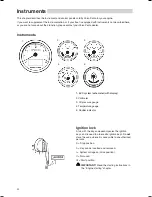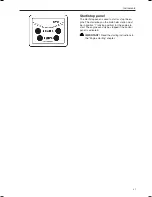
Hot surfaces and fluids
There is always a risk of burns when working with
a hot engine. Beware of hot surfaces. For example:
the exhaust pipe, Turbo unit, oil pan, charge air pipe,
starter element, hot coolant and hot oil in oil lines and
hoses.
Carbon monoxide poisoning
Only start the engine in a well-ventilated area. If op-
erating the engine in an enclosed space, ensure that
there is proper ventilation in order to remove exhaust
gases and crankcase ventilation emissions from the
working area.
Chemicals
Most chemicals such as anti-freeze, rustproofing
agent, inhibiting oil, degreasing agent etc. are haz-
ardous to health. Read and follow the instructions on
the packaging.
Some chemicals such as inhibiting oil are inflam-
mable and dangerous if breathed in as well. Ensure
good ventilation and use a protective mask when
spraying. Read and follow the instructions on the
packaging.
Store chemicals and other hazardous materials out
of the reach of children. To protect the environment
please dispose of used or leftover chemicals at a
properly designated disposal site for destruction.
Cooling system
There is a risk of flooding when working on the sea-
water system. Turn off the engine and close the sea
cock (where installed) before starting work on the
system.
Avoid opening the coolant filler cap when the engine
is hot. Steam or hot coolant can spray out and cause
burns.
If work must be carried out with the engine at operat-
ing temperature and the coolant filler cap or a cock
open or a coolant hose disconnected, open the cool-
ant filler cap carefully and slowly to release pressure
before removing the cap completely. Note that the
coolant may still be hot and can cause burns.
Lubrication system
Hot oil can cause burns. Avoid skin contact with hot
oil. Ensure that the lubrication system is not under
pressure before commencing work on it. Never start
or operate the engine with the oil filler cap removed,
oil can spray out.
Fuel system
Always use protective gloves when tracing leaks.
Liquids ejected under pressure can penetrate body
tissue and cause serious injury. There is a danger of
blood poisoning.
Always cover the generator if it is located under the
fuel filter. The generator can be damaged by spilled
fuel.
Steering system
The boat has a advanced steering system. DO NOT
change connectors, wiring or splice of the compo-
nents.
Service must be done by approved workshops which
have certifed personnel with qualified professional
training.
Electrical system
Cutting off power
Always stop the engine and break the current using
the main switches before working on the electrical
system. Isolate shore current to the engine block
heater, battery charger, or accessories mounted on
the engine.
Batteries
The batteries contain an extremely corrosive elec-
trolyte. Protect your skin and clothes when charging
or handling batteries. Always use protective goggles
and gloves.
If battery electrolyte comes into contact with unpro-
tected skin wash off immediately using plenty of wa-
ter and soap. If battery acid comes into contact with
the eyes, flush immediately with plenty of water and
obtain medical assistance without delay.
Safety Information
7
Summary of Contents for IPS 350
Page 1: ...OPERATOR SMANUAL VOLVO PENTA IPS 350 400 450 500 600 ...
Page 59: ...Turn Rotate Diagonally 57 Operation ...
Page 115: ...Notes 113 ...
Page 116: ...Notes 114 ...
Page 122: ......
Page 123: ......
Page 124: ...7747996 English 06 2007 ...










































